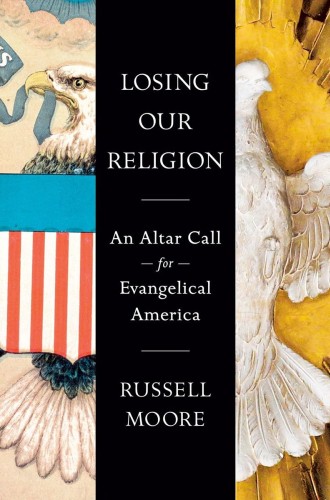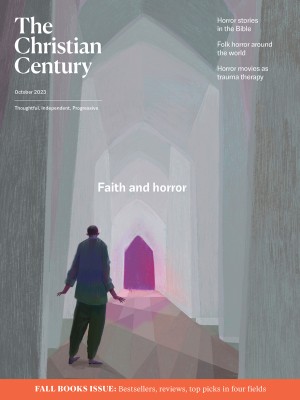Russell Moore speaks truth to his community
The Christianity Today editor and former Southern Baptist leader is gravely concerned about the soul of US evangelicalism.
Losing Our Religion is a tale of disillusioned love. Russell Moore affectionately recalls his childhood growing up in a Southern Baptist church in Mississippi, giving his youthful heart to Jesus, and completing seminary and doctoral training in Southern Baptist seminaries. He was so deep into the subculture, he quips, he knew the code language by heart. “The Lord has called Brother Jones from the pastorate into itinerant evangelism” could mean only one thing: “moral failure.”
Moore’s rise in the Southern Baptist ranks was so rapid it seemed almost predestined. In time he would teach systematic theology at his alma mater and function as dean and chief academic officer. In 2013, he became president of the denomination’s prestigious Ethics and Religious Liberty Commission. He served as a frequent and winsome guest on network television newscasts. (I should know; CBS News once bumped me for him.)
Read our latest issue or browse back issues.
Today Moore’s voice echoes far beyond Southern Baptist circles. He has authored more than a half dozen works of serious academic import. In 2022, he was named editor in chief of Christianity Today. Though his views on topics such as biblical authority and the existence of hell would not win much airtime in liberal pulpits, Moore’s influence as a public theologian reaches far beyond evangelicalism. Indeed, it is hard to think of anyone in the Protestant mainline who plays a comparable role.
Moore’s book has already won sympathetic attention by the New York Times, Religion News Service, and National Public Radio. Exactly why is a good question. Is it because Moore is unfailingly affable and perceptive? Or because the behemoth Southern Baptist Convention posts more than 13 million members? Or because the crises Moore targets—abuse, racism, and hypocrisy—touch a moment when the wider culture demands it? Or maybe all of the above?
Losing Our Religion is a combination memoir, polemic, and theological treatise. As a memoirist, Moore explains why he resigned from the Ethics and Religious Liberty Commission in 2020 and then soon withdrew from the denomination. Simply put, he got fed up with the SBC’s foot-dragging on racial reconciliation and its attempts to cover up sexual abuse by the exclusively male clergy. The denomination’s primary response to the latter, Moore argues, was not to explore the truth of the allegations but to dodge them. Publicly admitting guilt, the mantra ran, would undermine the denomination’s credibility and thus weaken its ability to proclaim the gospel at home and abroad.
Moore’s rehearsal of the personal attacks that followed his decisions—often descending into vilification—make for painful reading. We historians generally try to peek beneath the covers of such accounts to see if there isn’t more to the story. But the amplitude and viciousness of the remarks he denotes—often in quotations marks and tagged with elliptical identifiers (“Sunday school teacher”)—leave little doubt that Moore is telling the truth, not just as he sees it but as most people outside the ring would see it too.
As a polemicist, Moore argues that White evangelicals in general and Southern Baptists in particular have sold their theological souls to Trump’s political agenda, broadly defined. Exhibit A is their determined obliviousness to the former president’s lack of personal integrity. Exhibit B is their willingness to overlook Trump’s racism and misogyny in exchange for other goals. Exhibit C is their willingness to swap morality for political power, social status, and cultural prestige.
In Moore’s eyes, evangelicals’ shameful behavior of late doesn’t just reveal bad choices. More grievously, it betrays their core theological beliefs and historic ideals. “The outside world didn’t seem to be judging us by ‘secular’ standards,” he laments, but “by our own.” Shortsightedness is one thing; sustained, entrenched hypocrisy is quite another.
As a theologian, Moore argues that when religion becomes deeply embedded in partisan politics, it turns public policy decisions into sacred causes. Crusades “are made worse when they are framed as badges of religious identity.” These moves not only turn up the heat but remove them from the realm of reasoned debate. He grieves that in Southern Baptist circles, saying that a zealot has “blood on his hands” can serve as a compliment.
Moore especially targets evangelicals for the sin of tribalism. In principle a person’s orthodoxy should rest on their acceptance of the fundamental claim that God judges and redeems sinners. But in practice a pastor’s “command of Scripture is less relevant than suspicions about how he voted in the last election.” The test is loyalty. You are either on the bus or off.
The Wall Street Journal has called Moore “fiercely articulate,” and this book proves it. Flashes of wit keep the pages turning: when someone says that they are “going through spiritual warfare” or “feeling tempted to spend their paycheck on lottery tickets and strip-club lap dances,” think twice. Moore’s wide reading is on full display, but in unexpected ways: Calvin and Luther march alongside Mozart, Waylon Jennings, Willie Nelson, the Grateful Dead, Hannah Arendt, Flannery O’Connor, Walker Percy, and the atheist political scientist Jonathan Rauch.
My only reservation about Losing Our Religion is that Moore does not pay sufficient attention to boundaries. Exactly whom is he talking about? Most non-White evangelicals do not fit his categories. And if 82 percent of White evangelicals voted for Trump in 2016, that means that 18 percent—something like the population of Chicago and New York City combined—didn’t. In 2019, Christianity Today called for Trump’s removal. And countless broadly evangelical churches try to avoid partisan politics altogether, especially in the pulpit. Even within the “coalition of the willing,” significant gradations turn up. I know a lot of evangelicals who voted for Trump, but few who supported him without grave reservations.
Throughout the book, Moore offers guidelines for finding fresh water in old wells. The final chapter, aptly subtitled “How Revival Can Save Us from Nostalgia,” is itself worth the price of admission. One sentence sums it up perfectly: “The next Billy Graham quite likely not only did not vote for or against Donald Trump, but as likely also doesn’t speak English.”
And so it is that Moore—still a Southern Baptist preacher at heart—concludes with an altar call. “It just might be that American Christianity can find more in common with [Christians] across the world” than in the pew across the aisle. “And where there is evangelistic energy within American evangelicalism,” he adds, it “is often centered in immigrant churches, whether Dominican or Cambodian or Nigerian or Iranian.” And why not? Grace, after all, is still amazing.






